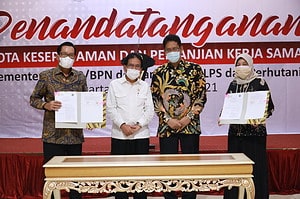The Presence of IDIC in Indonesia
The banking industry is a crucial component of the national economy. As an intermediary institution, banks play a vital role in driving the national economy, making the stability of the banking system a significant factor in the overall economic stability.
The 1998 Asian financial crisis, which also affected Indonesia, led to a banking crisis. This was marked by the liquidation of 16 banks and a decline in public trust in the Indonesian banking system. To address this crisis, the government implemented several policies, including providing a blanket guarantee on all bank obligations, including customer deposits. This was stipulated in Presidential Decree No. 26 of 1998 concerning Guarantees on the Payment Obligations of Commercial Banks and Presidential Decree No. 193 of 1998 concerning Guarantees on the Payment Obligations of Rural Banks.
In practice, the blanket guarantee did restore public confidence in the banking industry, but the overly broad scope of the guarantee led to moral hazard on the part of both bank management and the public.
To address this issue and maintain a sense of security for depositors while preserving the stability of the banking system, the extensive guarantee program needed to be replaced with a limited guarantee system. The Indonesian government then saw the need for a deposit insurance and bank resolution institution in Indonesia. Therefore, in 2004, the Indonesian government issued Law Number 24 of 2004 concerning the Indonesia Deposit Insurance Corporation, which also served as the legal basis for the establishment of a new state institution, namely the Deposit Insurance Corporation (IDIC). A year later, IDIC officially began operations on September 22, 2005.
The Role of IDIC after the Issuance of the PPKSK Law
With the increasingly strategic role and function of IDIC, the Indonesian government expanded the mandate of IDIC by issuing Law Number 9 of 2016 concerning Prevention and Handling of Financial System Crisis (PPKSK Law). Through the PPKSK Law, IDIC received a new mandate, namely the addition of two resolution methods in handling failed banks through Purchase & Assumption and Bridge Bank. In addition, IDIC also plays a role in preventing crises in the national financial system through the Banking Restructuring Program. In line with the expansion of this mandate, in 2017, LPS underwent a transformation to carry out these duties and authorities.
The Role of IDIC after the Issuance of Law Number 2 of 2020
In 2020, the Government issued Law Number 2 of 2020 concerning the Stipulation of Government Regulation in Lieu of Law Number 1 of 2020 concerning State Financial Policies and Financial System Stability for Handling the Coronavirus Disease 2019 (COVID-19) Pandemic, and/or in the Context of Facing Threats that Endanger the National Economy and/or Financial System Stability. Through this law, IDIC has new authorities, including:
- Conducting preparations for handling and increasing the intensity of joint preparations with the Indonesia Financial Services Authority (IFSA) for handling solvency problems;
- Deciding whether or not to save Non-Systemic Banks by considering criteria other than the lowest cost of rescue, and
- Implementing deposit insurance policies for groups of customers by considering the source of funds and/or the purpose of the deposit as well as the amount of the guaranteed value for these customer groups.
The Role of IDIC after the Issuance of Law Number 4 of 2023
In order to support and realize the development and strengthening of the financial sector in Indonesia, the government issued Law Number 4 of 2023 concerning the Development and Strengthening of the Banking Sector (P2SK Law). This law gives IDIC a new mandate to implement the Insurance Guarantee Scheme (IGS), starting five years after the law is enacted. Through this new mandate, it is hoped that it can provide protection for policyholders, insured parties, or participants of insurance companies whose business licenses have been revoked due to financial difficulties. In implementing the Insurance Guarantee Scheme, IDIC functions to guarantee insurance policies and resolve insurance companies through liquidation. In implementing the IGS, IDIC functions to guarantee insurance policies and resolve insurance companies through liquidation. In implementing the IGS, insurance companies that will participate in the program are insurance companies that are declared healthy, and to determine whether the insurance company is healthy or not, IDIC will coordinate with the Indonesia Financial Services Authority (IFSA).
Several changes in the P2SK Law compared to the previous law governing IDIC will cover at least eight things. Some of these changes include:
-
- The purpose of IDIC’s existence, which was previously only “to guarantee and protect public funds in banks,” has now been expanded to “guarantee and protect public funds in banks and insurance companies.”
- The functions, duties, and authorities of IDIC have also been expanded as a consequence of protecting public funds in insurance companies, in the form of the authority to guarantee insurance policies and handle problematic insurance companies. Furthermore, regarding the bank resolution function, as previously mentioned, IDIC now has a mandate as a risk minimizer in terms of bank examination and fund placement.
- Institutionally, the IDIC organization will also adjust to the new mandate, namely by adding a Member of the Board of Commissioners (ADK) in the field of the policy guarantee program and the presence of the IDIC Supervisory Agency.
- Then, from the deposit insurance side, IDIC also has the authority to guarantee deposits of certain customer groups and implement deposit insurance for government fund placements.
- Regarding the authority to place funds in banks. As previously known, IDIC received this authority temporarily through Government Regulation Number 33 of 2020 concerning the Implementation of the Authority of the Deposit Insurance Corporation in Implementing Steps to Handle Financial System Stability Problems, which was issued to support economic recovery due to the COVID-19 pandemic. Now, through the P2SK Law, this authority is made permanent and can be exercised whenever needed.
- Furthermore, from the resolution aspect, there are changes in the nomenclature regarding the status of bank supervision, as well as additional factors that are considered by IDIC in determining resolution options.
- Regulations on the banking restructuring program are also strengthened, especially in the taxation section and with the exception of capital market provisions and the Limited Liability Company Law.
- Lastly, a new and significant mandate is related to the Insurance guarantee scheme. In accordance with the mandate of the P2SK Law, IDIC will not only guarantee public funds in banks but also guarantee public funds in insurance companies.
IDIC Plays an Active Role in Maintaining Financial System Stability
IDIC, along with members of the Financial System Stability Committee (KSSK) consisting of the Ministry of Finance, Bank Indonesia, and the Indonesia Financial Services Authority, always synergizes and works hard to maintain the stability of the national financial system, which has been disrupted by the impact of the pandemic. And, through various strategic policies that have been issued, ultimately the stability of the national financial system and banking has been maintained until now.








